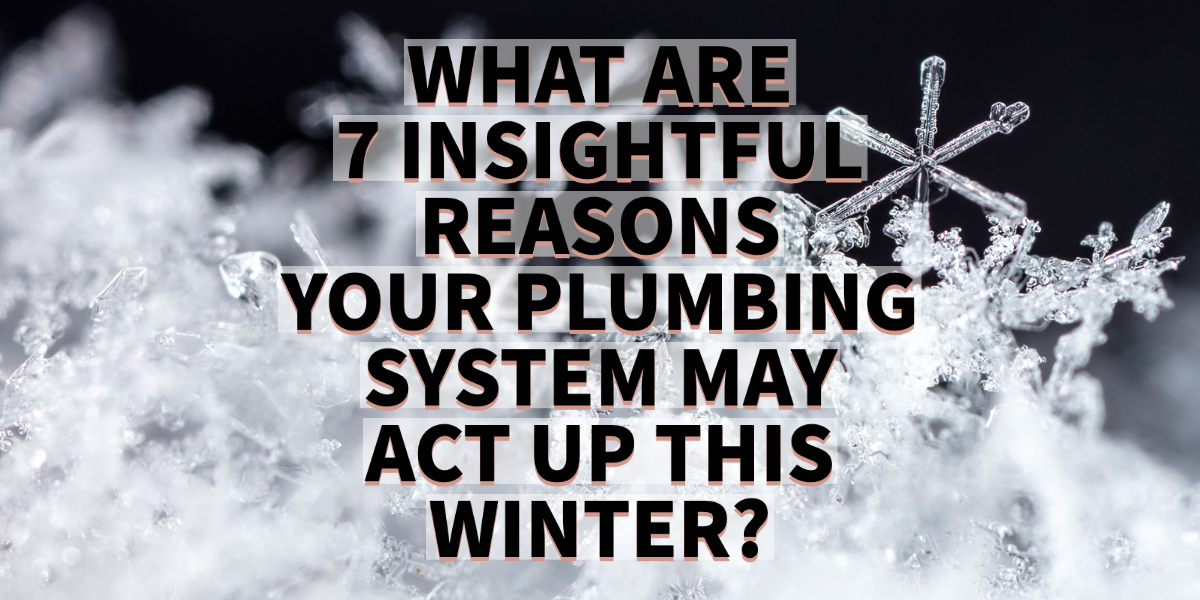Winter in Ohio can be brutal, and plumbing problems are more common during these months. There are a few reasons why your home’s plumbing is more likely to have issues when it’s cold outside. By following some basic preventative care tips and understanding how common winter plumbing issues occur, you can be prepared for anything Jack Frost throws your way this winter. Rest assured, knowing that Bellbrook Plumbing & Drain has got you covered!
1. IS YOUR KITCHEN DRAIN CLOGGED?
The winter season is a time when many people host gatherings. So, this means the kitchen is heavily used for food prep. With that in mind, if you’re not careful, the garbage disposal can get overused and clog your sink. You can avoid this issue by not putting particular food down the drain, such as cooking oil, fats, grease, eggshells, coffee grounds, meat bones, vegetable peels, corn husks, or potato/onion skins. There are other options for disposing of these food types besides your garbage disposal, so it’s in your plumbing system’s best interest to be mindful of this – especially during holiday meal preparation.
Remember, it’s a bad idea to pour dense food down the sink. This includes pasta, potatoes, and rice. They can swell and cause clogs in your pipes when they come into contact with water. Instead, scrape these kinds of food into the trashcan. A garbage can placed near your kitchen sink will help remind guests where to put their scraps. Another great tip to enforce is, after you use your garbage disposal, let the water run for 15 seconds to help wash away any leftover food and keep odors at bay. To clean it regularly, we recommend using a cleaning tablet designed specifically for disposals. Just be sure to follow the package directions.
2. IS YOUR WATER HEATER HAVING ISSUES?
Having guests in the home during the means lots of water use, and sometimes your home’s water heater can’t keep up. If you don’t want to deal with a malfunctioning water heater in the middle of the coldest months of the year, it is good to have it drained once every year. This is the best form of preventative maintenance you can enforce to help maintain your water heater. Additionally, if your water heater isn’t set to a high enough temperature, it won’t be able to heat sufficient water for your whole household. So, if you quickly run out of hot water, check the thermostat to see what temperature it is currently set at. Try raising it a few degrees and see if that helps meet your family’s needs. However, make sure never to go above 125 degrees, as this can pose safety risks and consume large amounts of energy!
Secondly, if your water heater isn’t running at all, check to make sure it’s still connected to its power source. Sometimes after a power outage, the connection can be lost. And lastly, you may use a water heater blanket. These help the machine run more efficiently and prevent heat loss as much as possible. Fortunately, these blankets can be bought from any local home improvement store. Lastly, if you have persistent issues with your water heater and can’t fix it yourself, call a licensed professional for assistance.
3. IS YOUR SUMP PUMP BACKING UP?
A sump pump’s primary function is to rid water from places that are challenging to drain. However, when a large snowstorm or heavy rain comes, it can fill the sump pump quickly and cause it to overflow or even freeze if temperatures dip low enough. Fortunately, there are things you can do to keep your sump pump running efficiently!
- Test Your Sump Pump: You should check your sump pump at least once this season. To verify that the float is working correctly, pour water into the sump pit until the float triggers and turns on the pump.
- Clean Your Sump Pump: If you haven’t gotten your sump pump cleaned recently, it’s better to do so now than to wait until later. Be sure to clear any obstructions and remove debris or particles that could clog the sump pump. Also, check the pit for anything else that could cause a blockage.
4. IS THERE AN INDOOR PIPE THAT IS FROZEN?
Frozen and burst pipes are a plumbing catastrophe that results in flooding and water damage to your home. To prevent this:
- Allow the Faucets to Drip: If you want to keep your water from freezing on especially cold nights, slightly open your tap so that a few droplets of water can come through.
- Open the Cabinet Doors: On cold nights, you should open the cabinet doors on all your sinks. This will circulate central air from your home and help keep pipes warmer.
- Use Pressure Relief Valves: You can keep pressure buildup to a minimum by installing pressure relief valves.
- Insulate the Pipes: Pipe insulation is an excellent and budget-friendly way to insulate any exposed pipes in your home.
5. IS THERE AN OUTDOOR PIPE THAT IS FROZEN?
When outdoor pipes freeze, it can cause extensive damage to your home if you don’t take the proper precautions. Outdoor pipes are susceptible to freezing when they are not winterized, which can lead to flooding and undetected water damage. To avoid this common issue, make sure to winterize your outdoor hoses before the cold weather sets in.
To winterize your hoses and spigots, follow these steps:
- Disconnect, drain, and store all garden hoses.
- Shut off outdoor spigots.
- Cover and insulate the spigot with a foam bib (optional).
- Protect any outdoor plumbing fixtures with pipe insulation (optional).
6. IS THERE AN OUTDOOR DRAIN THAT IS DAMAGED?
To avoid outdoor drains freezing in cold weather, upgrade them from plastic to metal. Plastic is more likely to break when it gets extremely cold outside. In addition, clear the area around the drain of leaves, grass clippings, small twigs, and other debris. And finally, when you are outdoors shoveling the driveway, take this chance to clear an opening around each drain to prevent clogs and allow the melted snow to drain swiftly. Furthermore, if you find heavy ice accumulated on an outdoor metal drain, pouring hot water over the ice will melt it faster.
7. IS THERE ENOUGH INSULATION OVER YOUR SEPTIC TANK?
If your septic tank is not sufficiently covered under the soil, the septic line or tank can freeze over. If this happens, waste inside the frozen septic tank would also freeze and expand, causing unpleasant plumbing issues like sewage backup into your home. To avoid this, check the soil around your plant for erosion. You want to fill in any areas that are eroded with more soil but be careful not to compress the existing soil. Additionally, you can also add straw over the top of the soil as an extra measure against bad weather.
At Bellbrook Plumbing & Drain, we want to help you with all your plumbing needs so that winter isn’t such a burden. Not everyone enjoys cold weather comes around, but unfortunately, we can’t avoid it. So, let us help you take care of your home’s plumbing system and make sure everything is running smoothly for you and your family! Call us at (937) 240-3731 or schedule an appointment online now by clicking here!

